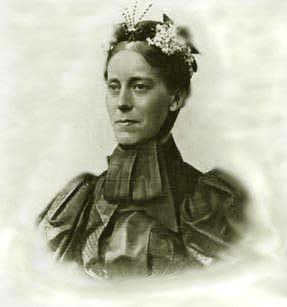
|

|



|
|
Семейство Cerambycidae: Подсемейство CERAMBYCINAE: Триба CALLICHROMATINI
Pseudictator kingsleyae Juhel, 2015
Ghana
Natural History Museum (London)
Экземпляр подарен музею путешественницей Mary Kingsley в 1896 году
(о его истории читайте ниже).

Photo by Pierre Juhel from web-site FLICKR.com |
Интересна история этого вида (род тоже является новым для науки).
Его единственный экземпляр хранился в Британском музее почти 120 лет.
12 экземпляров разных жуков с "Золотого Берега" были подарены Музею в 1896 году английской путешественницей и исследовательницей Африки Мэри Кингсли (Mary Henrietta Kingsley).
Названный ее именем впечатляющий усач был описан в 2015 году французским специалистом Pierre Juhel.
Довольно подробная биография Мэри Кингсли с ее портретом опубликована на сайте
African History и скопирована нами ниже.

Mary Kingsley |
Text from
africanhistory.about.com
Mary Henrietta Kingsley (13 October 1862 - 3 June 1900) was an British
explorer and writer who greatly influenced European ideas about Africa and
its people. Kingsley was an outspoken critic of European colonialism, a
champion for indigenous customs, and a dedicated campaigner for a revised
British policy which supported traders and merchants over the needs of
settlers and missionaries.
Mary Kingsley was born on 13 October, 1862, in Islington, London, the
daughter of a medical doctor. Her father, George Henry Kingsley
(1827-1892) travelled extensively, accompanying various nobles on journeys
around the world, keeping diaries and notes which he hoped to publish at
some future date. For much of her life Kingsley led a sheltered existence.
She was educated at home by her father - when he had the time - and
expanded her knowledge of natural history through the books in her
father's library. She noted in her journals that the only money spent on
her education was a little tutoring in German, so that she could help her
father with the translation of scientific texts. In comparison, over
£2,000 was spent on her brother Charles' education at Cambridge.
The family moved to Cambridge in 1886, partly because her brother was to
attend Christ's College, but also because her father was now too ill to
travel. It was time for him to get his enormous collection of notes and
translations ready for publication. His life's work would be a comparative
study of sacrificial rites around the world - a task that required Mary
Kingsley's untiring assistance, and which came to a sudden halt a few
years later with his death in February 1892. An event magnified by the
death of Kingsley's mother just six weeks later.
Kingsley re-appraised her life and discovered that she had few friends and
no outside interests - in her journal she says that she sought "something
to do that my father had cared for." She decided to travel to West Africa
to continue her father's "study of early religion and law."
Unfortunately, Victorian social convention required that Kingsley stay at
the beck-and-call of her brother, who controlled the family finances, and
so she moved to his home at Addison Road, London. Charles, capricious and
selfish by nature, did not have their father's redeeming charm, and it was
to Kingsley's great relief that he decided to travel through China,
departing from England in 1893, leaving her free to travel.
Apart from a brief trip to the Canaries in 1892, shortly after her
parents' death, Kingsley had not travelled abroad. She set out to learn as
much as possible about the nature of travel and exploration in the untamed
reaches of Africa. She asked for advice from her few friends and
acquaintances - "One lady remembered a case of a gentleman who had resided
some few years at Fernando Po, but when he returned an aged wreck of forty
he shook so violently with ague as to dislodge a chandelier, thereby
destroying a valuable tea-service and flattening the silver teapot in its
midst."
She next "cross-examined" various medical doctors who cheerfully displayed
maps showing the geographical distributions of tropical diseases. They all
advised her not to go, but asked that if she did, could she please be on
the lookout for suitable specimens.
Her third avenue of enlightenment was missionary literature, only to
discover "that these good people wrote their reports not to tell you how
the country they resided in was, but how it was getting on towards being
what it ought to be, and how necessary it was that their readers should
subscribe more freely, and not get any foolishness into their heads about
obtaining an inadequate supply of souls for their money." This was the
start of a growing distrust for missionary work in Africa, a vocation
Kingsley would campaign against on her return to England.
Fortunately Kingsley had one final source of information: an individual
who "had lived on the Coast for seven years." Although this was not the
same stretch of West African coast she intended exploring, his advice
proved to be the most useful.
"When you have made up your mind to go to West Africa the very best
thing you can do is get it unmade again, and go to Scotland instead; but
if your intelligence is not so strong enough to do so, abstain from
exposing yourself to the direct rays of the sun, take four grains of
quinine every day for a fortnight before you reach the Rivers [Oil
Rivers Protectorate, now known as Nigeria], and get some introductions
to the Wesleyans; they are the only people on the Coast who have got a
hearse with feathers."